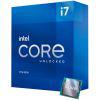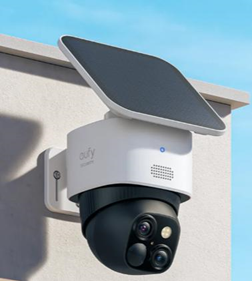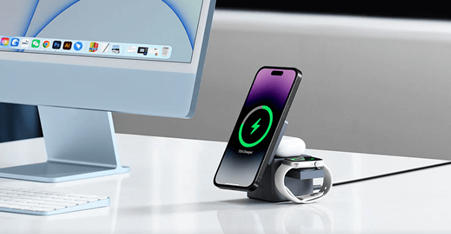The $399 Intel Core i7-11700K processor slots into Intel's Rocket Lake product stack at a price point that squeezes between two of AMD's most popular Ryzen 5000 processors. The 11700K's pricing should make it an attractive chip if you want the most performance from a mainstream Intel platform that you can get without paying the flagship price, but it faces stiff competition from the AMD chips that have dominated our list of Best CPUs (at least when they're available at retail).
Cypress Cove, Intel's first new architecture for desktop PC chips in six years, grants the Rocket Lake chips a 19% increase in IPC in most workloads. But the backported Cypress Cove (which was designed for 10nm) comes with a big tradeoff: Rocket Lake is still etched on the 14nm process and tops out at eight cores and sixteen threads. That's a step back from the previous-gen 10-core Comet Lake i9 models and pales in comparison to AMD's beastly 16-core Ryzen 9 5950X flagship.
Rocket Lake's 19% IPC gain largely offsets the performance hit from the reduced core count, but it left Intel in a tough spot as it carved its product stack into Core i9 and Core i7 families — both series top out at the same eight cores.
The $399 Core i7-11700K fits the definition of being a lower-end Core i9-11900K with the same eight cores and sixteen threads as the $539 flagship. And you could also save some cash by opting for the graphics-less Core i7-11700KF (it's identical in every other aspect) and score the chip for $374. That opens up a $75 gap between the 11700K and the Ryzen 7 5800X, which also doesn't come with an integrated graphics engine.
To account for the vagaries of binning and to hamstring the 11700K to create artificial segmentation, Intel dropped the 11700K's peak boost frequency by 300 MHz compared to the Core i9-11900K, reduced the memory frequencies in low-latency mode, and dropped its support for the new Adaptive Boost Technology (ABT). The ABT tech is effectively an auto-overclocking feature that doesn't void your warranty, but the 11700K is a fully overclockable chip. That means that losing that feature, or the extra 300 MHz of peak boost speed, might not dissuade overclockers looking to save $140 over the 11900K.
| Suggested Price | Cores / Threads | Base (GHz) | Peak Boost (Dual/All Core) | TDP | iGPU | |
|---|---|---|---|---|---|---|
| RKL-S Core i9-11900K (KF) | $539 (K) - $513 (KF) | 8 / 16 | 3.5 | 5.3 / 4.8 | 125W | UHD Graphics 750 Xe 32EU |
| RKL-S Core i7-11700K (KF) | $399 (K) - $374 (KF) | 8 / 16 | 3.6 | 5.0 / 4.6 | 125W | UHD Graphics 750 Xe 32EU |
| RKL-S Core i5-11600K (KF) | $262 (K) - $237(KF) | 6 / 12 | 3.9 | 4.9 (TB2) / 4.6 | 125W | UHD Graphics 750 Xe 32EU |
| RKL-S Core i5-11400 (F) | $182 - $157 | 6 / 12 | 2.6 | 4.4 (TB2) / 4.2 | 65W | UHD Graphics 730 Xe 24EU |
The 11700K drops into a gaping hole in AMD's product stack — AMD has a $150 gap between the $449 Ryzen 7 5800X, which also comes with eight cores, and the $299 six-core Ryzen 5 5600X. The obvious pricing gap in AMD's stack should give the 11700K some breathing room for now, though AMD says that its upcoming Ryzen 5000 G-series chips, otherwise known as the 'Cezanne' APUs, will plug that pricing gap when the $359 Ryzen 5 5700G comes to market in August 2021.
However, the 5700G appears to target the downstream Core i7-11700 instead of the K series model, giving the 11700K the opportunity to thrive as a less-expensive 11900K and/or Ryzen 7 5800X alternative. It just so happens that Intel's own strict segmentation impacts the 11700K's performance significantly, reducing its appeal.
Lately though, the winning chip is the chip that you can actually buy. As such, the Core i7-11700K has benefited from one almost insurmountable advantage — availability. AMD has been hamstrung by supply shortages spurred by pandemic-related supply chain disruptions coupled with unprecedented demand, leading to price gouging on nearly its entire stack.
Supply is improving for AMD, though, and the Ryzen 7 5800X has been broadly available at or near its MSRP for roughly the past month. And supplies seem to be holding steady, setting up a pitched battle with the Core i7-11700K.
Intel Core i7-11700K Specifications and Pricing
We've covered the Rocket Lake family in-depth in our launch-day review, so head there for finer-grained details of the architecture and broader product family. Intel spreads the Rocket Lake (RKL-S) chips across the familiar Core i9, i7, and i5 families, but Comet Lake Refresh (CML-R) chips step in for Core i3 and Pentium. Those chips feature the same architecture as other Comet Lake chips but come with slightly increased clock speeds. You can learn more about them here.
Intel's chip frequencies have become a confusing array of four different flavors of Turbo Boost, many with both single- and multi-core ratios, that differ based on each family of chips. We've narrowed these listings down to the peak boost frequencies in the table below, with each indicating the peak boosting tech used. You can find more information on Rocket Lake's boost tech and a more expansive listing of all the frequencies here.

| Suggested Price | Cores / Threads | Base (GHz) | Peak Boost (Dual/All Core) | TDP | iGPU | L3 | |
|---|---|---|---|---|---|---|---|
| Ryzen 9 5900X | $549 | 12 / 24 | 3.7 | 4.8 | 105W | None | 64MB (2x32) |
| RKL-S Core i9-11900K (KF) | $539 (K) - $513 (KF) | 8 / 16 | 3.5 | 5.3 / 4.8 | 125W | UHD Graphics 750 Xe 32EU | 16MB |
| Ryzen 7 5800X | $449 | 8 / 16 | 3.8 | 4.7 | 105W | None | 32MB (1x32) |
| RKL-S Core i7-11700K (KF) | $399 (K) - $374 (KF) | 8 / 16 | 3.6 | 5.0 (TB3) / 4.6 | 125W | UHD Graphics 750 Xe 32EU | 16MB |
| Ryzen 5 5600X | $299 | 6 / 12 | 3.7 | 4.6 | 65W | None | 32MB (1x32) |
| RKL-S Core i5-11600K (KF) | $262 (K) - $237(KF) | 6 / 12 | 3.9 | 4.9 (TB2) / 4.6 | 125W | UHD Graphics 750 Xe 32EU | 12MB |
| RKL-S Core i5-11400 (F) | $182 - $157 | 6 / 12 | 2.6 | 4.4 (TB2) / 4.2 | 65W | UHD Graphics 740 Xe 24EU | 12MB |
| CML-S Core i5-10400 | $182 | 6 / 12 | 2.9 | 4.3 | 65W | UHD Graphics 630 | 12MB |
| Ryzen 5 3600 | $200 | 6 / 12 | 3.6 | 4.2 | 65W | N/A | 3MB |
| CML-R Core i3-10325 | $154 | 4 / 8 | 3.9 | 4.7 / 4.5 | 65W | UHD Graphics 630 | 8MB |
The Core i7-11700K uses the same eight-core 16-thread silicon as the Core i9-11900K, but there are a few key differentiators. The 11700K has a lower binning that results in lower peak clock frequencies of 5.0 GHz, a 300 MHz reduction compared to the 11900K, lower peak memory frequencies in low-latency Gear 1 mode (more on that shortly), and culled Thermal Boost Velocity (TVB) and Adaptive Boost Technology (ABT) support. Here's a closer look at the disabled boost tech:
TVB frequencies only activate if the processor is under a certain temperature limit, but most motherboard makers ignore those limits. That means a chip with the tech will likely operate at the faster speeds regardless of chip temperature, at least on higher-end motherboards. That also means that culling the feature from the 11700K doesn't have as much of an impact as the drastically reduced frequency ceiling — TVB only offers an extra 100 MHz for both single- and all-core boost frequencies.
Think of Intel's Adaptive Boost Technology (ABT) much like a dynamic auto-overclocking feature that applies to all-core boosts but remains within warranty. ABT doesn't come with a guaranteed frequency — peak frequencies will vary based upon the quality of your chip, cooler, and motherboard power delivery. Still, because the chip stays within Intel's spec, it is a supported feature that doesn't fall into the same classification as overclocking, so it's fully within warranty.
Intel only offers ABT on Core i9 K and KF processors, but the basic principle and functionality of the feature should be portable to any Intel chip. That means Intel removed this feature from the 11700K simply to make customers pay more for it by stepping up to its most expensive desktop chips.
Intel lists the Core i7-11700K with a 125W TDP, the same as the previous-gen 10700K, but this only encompasses the PL1 (Power Limit 1) level that occurs when the chip operates at its base frequency. The 11700K jumps to 251W when it operates at boost frequencies (PL2 - Power Limit 2). That's an increase over the 10700K's 224W PL2, but both chips have the same recommended Tau (boost duration) of 56 seconds. As with all other Intel chips, motherboard vendors are free to ignore these limits if their motherboards have adequate power circuitry, so these limits are rarely seen on higher-end boards unless you manually force your motherboard to adhere to them.
Finally, the Core i9-11900K is the only Rocket Lake chip supporting DDR4-3200 memory in the optimal configuration at stock settings, which is called 'Gear 1.'This setting allows the memory controller and memory frequency to operate at the same speed (1:1), thus providing the lowest latency and best performance in lightly-threaded work, like gaming.
All other Rocket Lake chips, like the Core i7-11700K, only officially support DDR4-3200 with the 'Gear 2' setting, which allows the memory to operate at twice the frequency of the memory controller (2:1) and results in higher data transfer rates. This can benefit some threaded workloads but also results in higher latency that can lead to reduced performance in some applications — particularly gaming. We have yet to see a situation where Gear 2 makes much sense for enthusiasts. Instead, this setting is most useful for those chasing overclocking frequency records that don't directly equate to real-world performance boosts.
The Core i7-11700K's official top speed for the Gear 1 setting is DDR4-2933, and running DDR4-3200 in lower-latency Gear 1 mode is considered overclocking, which voids your warranty. Intel isn't known for harsh memory overclocking restrictions when processing returns, but running memory beyond the spec does technically void your warranty. We've found that Gear 1 provides the best all-around performance, so that's all you'll see in our testing for this review. You can take a closer look at the performance deltas we've observed with the modes here.
MORE: Best CPUs
MORE: CPU Benchmarks Hierarchy
MORE: All CPUs Content









